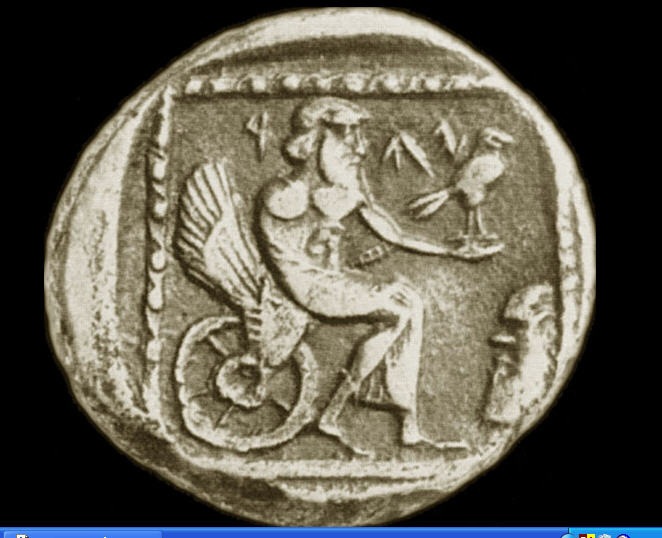The topic is whether the truth of Christianity is dependent on the literal historicity of the Torah. My opponent has not shown why that is true; he has, as far as I can tell, barely made the attempt. Rather, he has reduced himself to the
assertion that if El and Yahweh are two gods who were subsequently redacted into one, then Jesus cannot have been the incarnation of that God. Why past error prohibits all possibility of correction. Presumably he calls planets by their Roman names without believing in the Roman gods; how can he possibly believe in the planets? Again, how can he believe in astrophysics when Newton practiced astrology, or in chemistry when Boyle practiced alchemy?
He begins his second section with the heading
Existential? The question mark is
apropos, because he apparently does not understand existentialism as a school of thought. In existentialism (or phenomenology), there is no qualitative difference between the experience of non-existent imaginary realities (whether publicly knowable, as with Frodo, or purely subjective, like a hallucination) and objective realities (say, a fire). And because existentialism/phenmonology deals with the nature of
subjective or personal experience, 1. it doesnt have to deal with the question of the reality of the thing experienced (a significant advance in the history of philosophy following Kants devastating critique of metaphysical thinking), and 2. it views even realities we think of as objective as acted upon by the viewer through the categories and processes of perception (again following Kant but taking his thought in a different direction). This second point goes right to the heart of his objection that the present experience of Christ happens through hearing a human being announce the gospel to me, hearing a human being proclaim my sins forgiven, and partaking in the Christian ritual of eating bread and wine; I experience those as true interactions with Christ because I have faith in their for me-character. Again, not an argument. I think there are arguments, but once again, thats not the debate were having as much as you want to make it into that debate. But it is that aspect of Christianity that is actually of critical importance to the faith- and one that could not be overturned simply by finding out that El and Yahweh were once separate gods redacted into one- just as a person who experiences a burn from a fire is not alleviated because another person experienced only the light of the fire and not the burn, while another explains the chemical composition of the elements being consumed, while yet another person trumpets that fire harmless because sensory-reality is an illusion.
Once again, the assumption seems to be that all claims must be rationally or empirically justified in ways that purely objective, even though there is absolutely no way to go about living in that manner. We are not Vulcans, Mentats, or androids. A person must act on probabilities; if she does not, she will ultimately find herself unable to act at all. Instead, we rely in instinct, desire, and intuition. We
should always strive to be rational, and avoid instincts, desires, and intuitions that are expressly
irrational. But we cannot reduce human experience to the purely rational; our beliefs
should be within the
bounds of rationality, but that doesnt mean they must be reducible to the barest
logically necessities. Christianity, both postmodern and premodern, is in this sense more realistic about the nature of human knowledge than Enlightenment/modernist deism. It is rational, while not being reducible to rational deduction; it is historical, while not being reduced to a historical phenomenon. It is a worldview that takes stock of the totality of human life.
What, then, you ask, could possibly count as evidence? Or, in your own words:
No matter what evidence exists or may be discovered against the ancient Hebrew god(s), your belief is based completely on Yeshua
.
If no information can affect your belief, why did you want to debate information?
First of all, I deny the premise. Youve implied that I dont actually care about the scholarship of the Third Quest for the Historical Jesus, when Ive expressly said I do (in fact, I brought it up, and have doubts that youd ever heard of it before our debate), and you havent actually shown that the present state of scholarship closes the door to Christian belief. Although it would be difficult- painfully and personally difficult- to accept historical conclusions that demonstrated that Christ is not risen, is not God, did not rescue humanity, and cannot come to us under the forms of water and bread and wine,it must be the case, by definition, that historical investigation should be able to at least demonstrate that Jesus is not risen, did not believe he was God, did not seek to save humanity, and had no intention of regularly visiting his people under bread and wine, and that those beliefs openly contradict the intentions of the historical Jesus (proving he was not God is, of course, outside the limits of possible historical investigation and enters the realm of the philosophical). These possibilities must be the case because saying that Jesus was a real genuine person who lived in a precise time and place and engaged with his specific human culture
necessarily implies that reports about Jesus is historically conditioned and therefore open to the historical process of validation and refutation.
That sort of information can affect my belief, and it has. Themes that are not usually part of Lutheranism but that are central to the Third Quest (and yes, largely agreed-upon; that specific quote really isnt in those books- prove me otherwise with a screen capture; and whats more, Theissen and Charlesworth are both members of the Third Quest!) - kingdom of God, inaugurated eschatology, remnant theology- have changed the shape of my theology, as they have for thousands of well-informed and historically-conscious Christians. And the conclusions of, say, John P. Meier- that Jesus did not walk on water, did not calm a storm on the Sea of Galilee, and did not declare all foods ritually clean- substantially affect my reading of those passages and their integration into the larger picture of gospel-formation and early Christian religious development. But I see nothing in the contemporary search for the historical Jesus that would cause me to doubt Christianity as a worldview (and certainly not some claim about the canonization of the gospels based on a quote that is
not an argument for canonization, but is about the symmetrical beauty between the four winds and the four gospels that were already used canonically in Irenaeus' church).
How much more with the possibility that El and Yahweh were two separate gods worshiped by the Canaanites, include the proto-Israelites, whom the later Israelites redacted into one. Previous error in no way prohibits correction, even when the correction makes positive reference to the error. The later view could
perhaps be counted incorrect if it were based on it, as BLTN has put it, but even there thats simply not the case; Israelite monotheism is a specific repudiation of Israelite polytheism, and not only polytheism in the strict sense of having multiple gods but in the broader sense of the attendant myths of those gods. I dont know any reasonable Christians who think that during creation Yahweh actually battled a cosmic serpent (even though there are echoes of that myth in redacted text). And even if Israelite monotheism were "based" on it Israelite polytheism (however that works), it still would no more a guarantor of falsehood than a geocentric cosmology would guarantee the falsehood of botany.
Of course, theres also the sense in which some form of preservation also affirms elements of earlier Yahweh-and-El worship. But those elements that are affirmed (namely, the worship of Yahweh/El as a creator-god) are specifically those elements which not only Christians affirm but most people in the world affirm (the creation of the world by some sort of divine force with a moral purpose for humanity). They are no unique to proto-Israelite polytheism.
(
n.b. Thank you for conceding on the terminology of Babylonian/Canaanite, but I still have to insist that the usage of Babylonian isnt only unspecific, but entirely improper. The Canaanite pantheon was over a thousand years, and the redaction of Yahweh and El quite complete, before the Neo-Babylonian Empire conquered the Levant from the Assyrians c. 600, and there were only in control of the area until 539 BCE.)
Oh, and as for Deuteronomy 32:8-9, you can only really read that as describing a relationship between two separate deities if youre assuming that theyre there, but as
every Pentateuchal scholar knows (at least, Pentateuch scholars who would never be caught dead using the Complete Jewish Bible), Deuteronomy is
not a redactional text and is very likely a
literary composition of the seventh century, well after the redaction of J and E into a single text and specifically designed to reinforce exclusivistic monotheism (Friedman,
The Bible With Sources Revealed). The text simply uses Elyon to refer to the one true God in his capacity as a cosmic creator and ruler over all nations, and Yahweh to refer to God in his specific relationship with Israel.
To sum up: I have no in any way proven- or sought to prove- that Christianity is grounded in historical fact. I have attempted to show, because you asked, that I think the New Testament should be equally open to historical investigation as the Old. And in consequence I have attempted to demonstrate, because BLTN seemed incredulous, that the contemporary quest for the historical Jesus does not undermine the experience of the Christian faith or the truthfulness of the Christian worldview. These elements took up an unusual amount of the debate, because BLTN seems practically unable to understand a Christian viewpoint that is not fundamentalist. But for the purposes of this debate, I think I have not only attempted to show, but have indeed shown- not only by rational argument, but simply by the fact that I exist as a rational being who holds both positions simultaneously- that Christianity is not dependent on the literal historicity of the Torah and can go on, and has gone on in tandem with two hundred years of historical criticism, no matter how complicated and sullied the pre-history of Israels gods.


